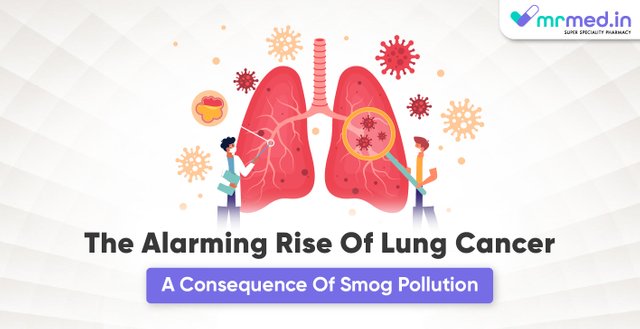Millions of people worldwide lose their lives to lung cancer every year, a disease that has dramatically increased in occurrence in recent years. While a number of causes are involved in this growth, smog pollution is one important and gravely troubling aspect. The main source of smog, a mixture of fog and smoke, is pollution released by industry, transportation, and other human activity. This essay explores the link between the rise in lung cancer incidence and smog pollution, highlighting the pressing need for international action to address this environmental emergency.

Knowing About Smog and Pollution
Particulate matter, ground-level ozone, nitrogen oxides, volatile organic compounds, heavy metals, and particulate matter are some of the air contaminants that combine to create smog, an unpleasant combination. Because of industrial operations, agricultural practices, and the combustion of fossil fuels, these pollutants are discharged into the atmosphere. In addition to degrading the quality of the air, smog pollution puts human health in serious danger by causing heart problems, lung cancer, and other respiratory and cardiovascular conditions.
The Connection Between Lung Cancer and Smog Pollution
Particulate matter, or PM2.5 and PM10 particles, are microscopic particles floating in smog that have the ability to enter the bloodstream and penetrate deep into the lungs. PM2.5 particles have a diameter of 2.5 micrometres or less, while PM10 particles have a diameter of 10 micrometers or less. Long-term exposure to these particles can lead to lung cancer's precursors, DNA damage, oxidative stress, and inflammation.
Ozone (O3): One of the main ingredients of smog, ground-level ozone can irritate the respiratory system and affect lung function. Long-term ozone exposure destroys lung tissues, increasing a person's risk of developing lung cancer.
Nitrogen Oxides (NOx) and Volatile Organic substances (VOCs): These two types of emissions, primarily from industrial and automobile exhaust, combine to generate hazardous substances in the atmosphere. These chemicals raise the risk of lung cancer by damaging lung cells and causing mutations.
The Worldwide Effect
According to estimates from the World Health Organisation (WHO), outdoor air pollution, which includes smog, causes millions of premature deaths annually. Among those afflicted, lung cancer is the main cause of death. The weight of this dilemma frequently falls on developing nations because of their fast-rising rates of industrialization and urbanisation. Furthermore, smog pollution has negative consequences for ecosystems, agricultural production, and general quality of life in addition to its detrimental impacts on human health.
Dealing with the Problem
At the local, national, and international levels, concerted efforts are needed to address the concerning increase in lung cancer cases brought on by air pollution. There are several tactics that may be used to address this urgent problem:
Make the Transition to Clean Energy: By abandoning fossil fuels in favour of renewable energy sources like solar, wind, and hydroelectric power, emissions may be greatly reduced, lessening the effects of smog pollution.
Encouraging the use of walking, bicycling, and public transit can help cut down on the number of cars on the road, which will reduce emissions and improve air quality.
Strict Laws and Enforcement: Governments must enact and uphold stringent laws governing certain sectors and vehicle emissions. Strict fines for non-compliance and ongoing monitoring can serve as effective deterrents.
Increasing Public Awareness: People can be inspired to make environmentally responsible decisions by learning about the dangers that smog pollution poses to their health and by supporting eco-friendly activities.
Investing in Research: New approaches to pollution management, air quality monitoring, and clean technology research can all be facilitated by financial support.
In summary: There is serious worry over the increasing number of lung cancer cases associated with air pollution, and governments, businesses, and individuals must take quick action to address this issue. We can lessen the effects of smog pollution and protect the health and welfare of present and future generations by implementing sustainable practices, supporting clean energy, and pushing for stronger environmental laws. To tackle this environmental disaster and build a better, healthier future for everybody, we must work together.
Source: -https://mrmedpharmacy.blogspot.com/2023/11/the-startling-increase-in-lung-cancer.html